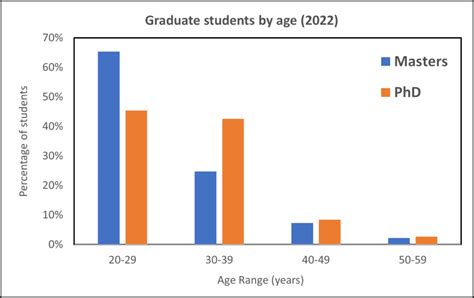Introduction

Embarking on the path of a doctoral degree requires dedication, perseverance, and a significant investment of time. The average age at which individuals complete their PhDs plays a crucial role in understanding the time commitment involved and the factors that influence it. This article explores the average PhD age and provides insights into the variations across different fields and demographic groups.
Average PhD Age
According to the National Center for Education Statistics (NCES), the average age of PhD recipients in the United States was 35 years old in 2018-2019. This age has been relatively stable in recent years, with slight fluctuations ranging from 34 to 36 years.
PhD Age Variations
The average PhD age varies significantly across different fields of study and demographic groups.
Field of Study:
- The highest average PhD age is found in Medical and Health Sciences, with a median of 38 years.
- Biological and Agricultural Sciences also have a high average age of 36 years.
- Physical Sciences and Engineering have PhD ages in the mid-30s range.
- Social Sciences and Arts and Humanities have relatively lower average PhD ages, ranging from 32 to 34 years.
Demographic Factors:
- Gender: Female PhD recipients are slightly older than their male counterparts, with an average age of 36.9 years compared to 34.7 years for males.
- Race and Ethnicity: Asian PhD recipients have the youngest average age of 33.4 years, followed by White (35.6 years), Hispanic (36.3 years), Black (36.7 years), and Native American or Alaskan Native (37.7 years).
- International Students: Non-US citizen PhD recipients are typically older, with an average age of 37 years.
Factors Influencing PhD Age
Several factors contribute to the variations in PhD age, including:
- Length of Training: Different fields of study require varying lengths of doctoral training. Medical and Health Sciences, for example, involve a prolonged clinical training component.
- Research Experience: Prior research experience can reduce the time required to complete a PhD.
- Funding: Financial support can alleviate the pressure to complete the degree quickly, allowing for more comprehensive research and publication activities.
- Life Circumstances: Family responsibilities, financial constraints, and personal health can impact the timeline for completing a PhD.
Common Mistakes to Avoid
To optimize the time spent pursuing a PhD, consider avoiding these common mistakes:
- Overestimating research capacity: Be realistic about the time frame required to conduct meaningful research.
- Lack of focus: Set clear research goals and stick to them.
- Neglecting writing: Make writing a consistent part of your daily routine.
- Isolation: Seek support from mentors, peers, and family.
Tips and Tricks
To enhance your efficiency and accelerate your PhD progress, follow these tips:
- Maximize research opportunities: Engage in research projects early on.
- Seek guidance from experts: Consult with experienced professors and researchers.
- Utilize research resources: Explore databases, libraries, and conferences.
- Prioritize writing: Schedule time for writing and stick to it.
- Stay organized: Track research progress, deadlines, and appointments.
Conclusion
The average PhD age provides valuable insights into the time investment required for doctoral studies. While it varies across fields and demographic groups, understanding these factors can help individuals make informed decisions about their educational journey. By avoiding common mistakes and implementing effective strategies, aspiring PhD candidates can optimize their time and achieve their academic goals efficiently.
